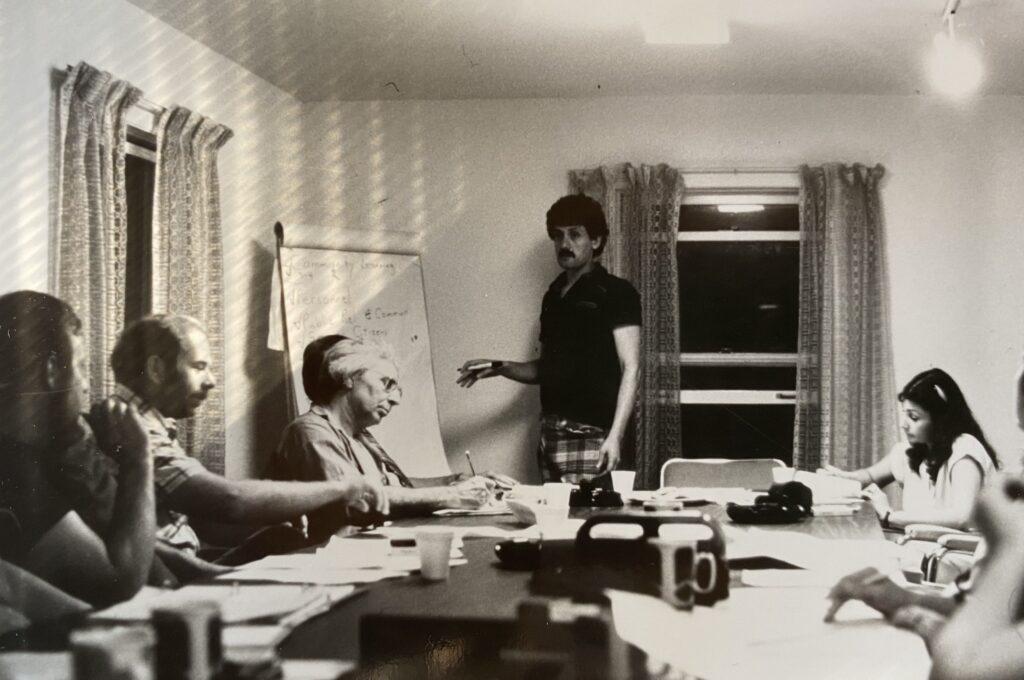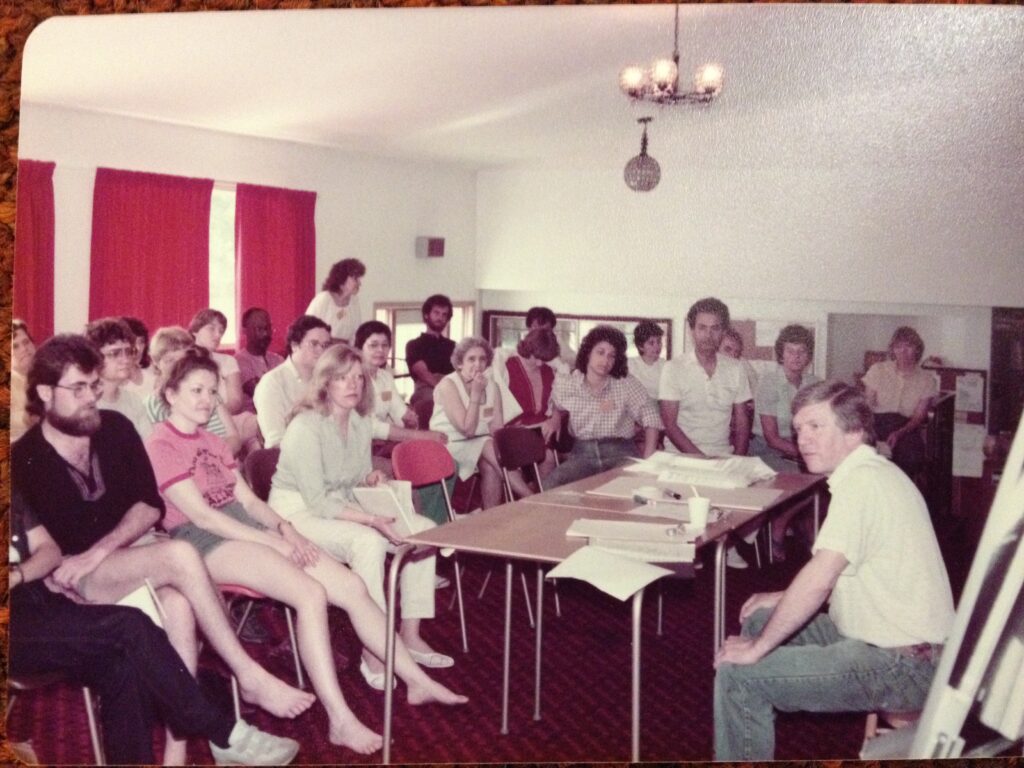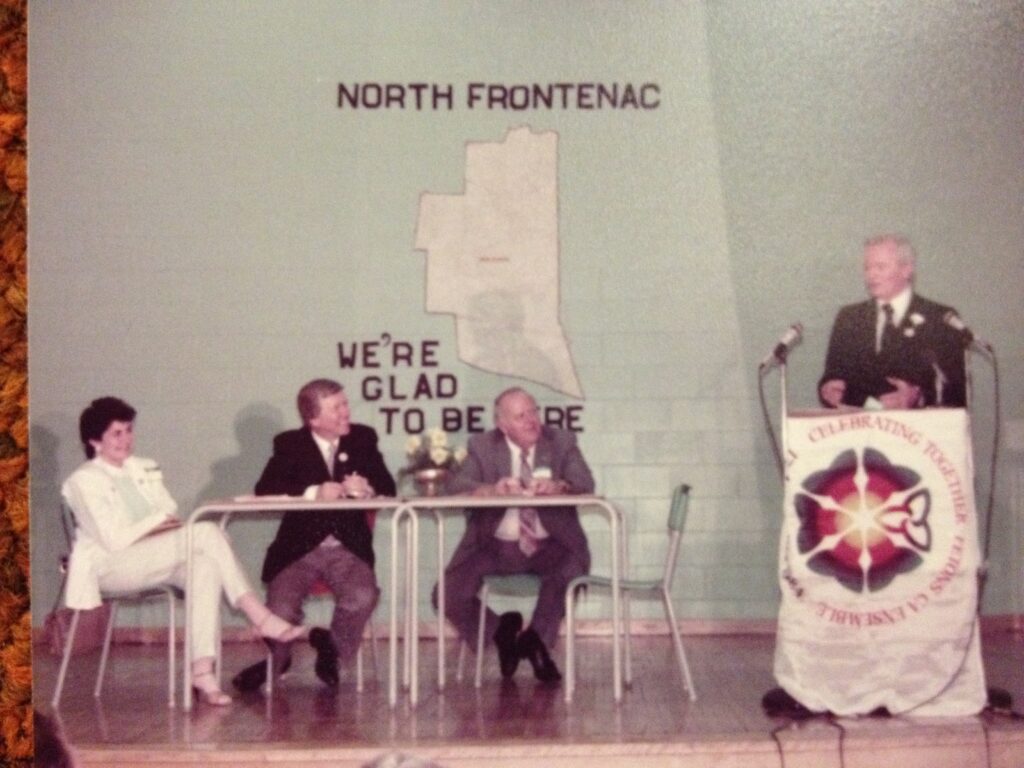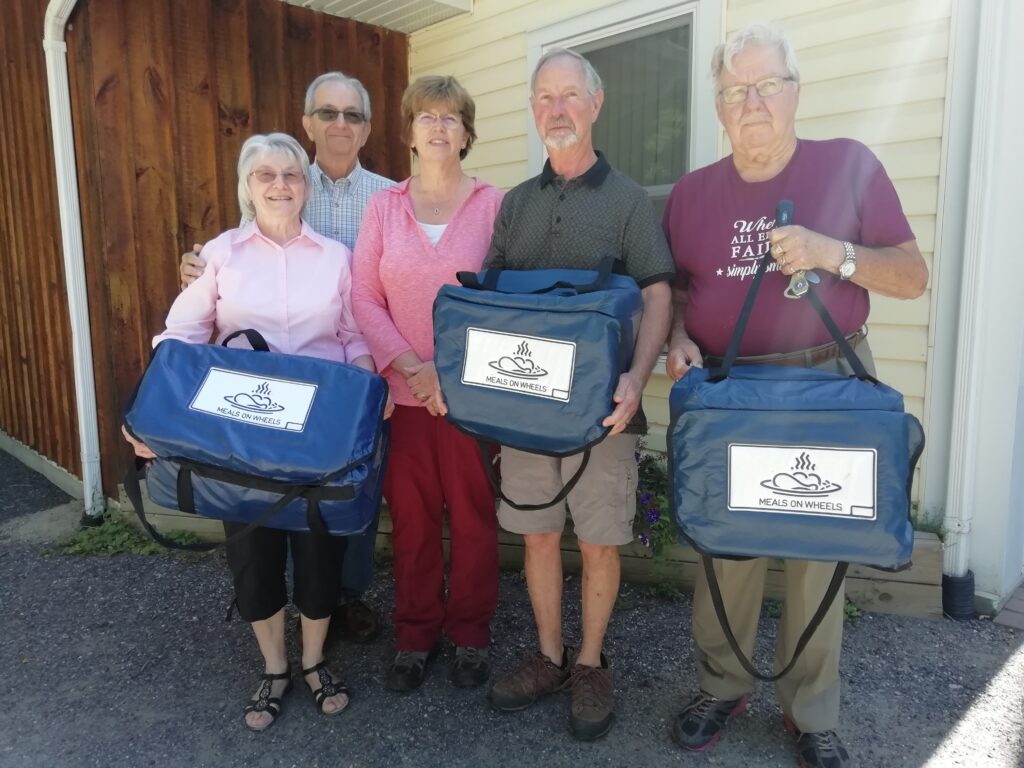Our Name & History
The Early Days
In November 1970, a group of citizens met in the Anglican Rectory at Sharbot Lake to discuss problems shared by residents in the eight northern townships of Frontenac County – – problems, such as decreasing population, economic difficulties, lack of social services and limited community spirit.
With representatives of St. Lawrence and Algonquin College Continuing Education Departments, the group hosted a public meeting at Sharbot Lake High School on February 2, 1971. Agreement was reached that the ‘sense of community’ had to be revitalized. (In earlier years, the railroads provided a link between hamlets and villages and small rural settlements. The passage of that era contributed to residents’ isolation).
A ‘Communication Group’ was officially formed and in March 1971 the first edition of the North Frontenac News – – a mimeographed, single sheet paper – – was printed and distributed free of charge. (Mervyn Rutherford, Editor; Reverend Martin Walsh, Treasurer; Don Morrow, Circulation Manager, Ross Baker, Advertising Manager).
During that year, a Local Initiatives Program Grant was obtained to develop office space and room for any public group to hold meetings in the rectory basement, where the Clothing Depot was located until the fall of 2001.
In 1972 another grant was received for assistance in development of community initiatives. Continuing their efforts as facilitators who assisted community members in taking responsibility for community problems, the Group developed a proposal for multi-service centre funding. Two workers were hired to analyze organizational and social service issues in North Frontenac. The first of many Senior Citizens’ Clubs was organized, the Children’s Aid Society was encouraged to work at the facility, and a part-time federally funded employment office opened. In response to results of a questionnaire, the Communications Group facilitated the development of a Summer Swim Program that was co-sponsored by townships and the Sharbot Lake and District Lions Club. We continued our coordinating responsibilities with the program for many years.
With Ministry of Community and Social Services’ funding approval in 1973, the members established a Management Council and opened office space in the refurbished former rectory.
During the winter of 1973-74, a group of citizens, including some Management Council members, was brought together to discuss another vital concern. St. Lawrence College funded a worker to conduct the study which ultimately resulted in the formation of the North Frontenac Association for the Mentally Handicapped, now known as Community Living – North Frontenac.


The Beginning
In 1975 our organization became incorporated as North Frontenac Community Services – – the first multi-service centre in the province. Its stated concerns:
“(1) the residents of North Frontenac have ready access to a full array of social services and these be coordinated, appropriate and effective;
“(2) citizens be encouraged and assisted to participate in community development and the solving of common problems.”
The first Directors of North Frontenac Community Services, as stated in the Corporation’s Charter were: Gail Anne Lewis, Mountain Grove; Marcel Arthur Giroux, Sharbot Lake; Peter William Bell, Sharbot Lake; Clive Stanley Wilson, Sharbot Lake; Helen Mary Vizely, Sharbot Lake; Margaret Leigh Sweet, Sharbot Lake; Albert Clarence Cox, Arden; Wayne Albert Robinson, Parham; David John Summers, Plevna; Ann Marie Knapp, Tichborne.
From 1976 to 1982, workers funded by St. Lawrence College at North Frontenac Community Services helped develop several new services and positions including the Senior Citizens’ Home Support Program, the Adult Protective Services Program, and the first Coordinator of Volunteers. A committee of the Board was formed in 1978 to determine what could be done about unemployment and economic development. A worker organized many educational and training events and conducted community meetings with representatives of Township Councils, businesses, and North Frontenac Community Services, then worked at the acquisition of funding that contributed to the establishment of Highway #7 Community Development Corporation.
During that same period, under the guidance of Queen’s University Law Students Rural Legal Services, a North Frontenac Community Services Community Legal Worker provided services that included summary advice, advocacy, and information for residents of North Frontenac. Identification of need for these and more extensive legal services resulted in the establishment of the North Frontenac Community Services Rural Legal Clinic that is now an independent service.
Identified as a very real need, the position of Family Counsellor was started in 1979 to provide assistance for individuals and families. The Community Service Order Program started in 1980 to allow probationers to contribute their time to community-oriented volunteer tasks, rather than incarceration.
A small group of women began to advocate for local services to enhance the lives of children and their parents in 1983. With community support, they started a drop-in centre and toy library at Sharbot Lake the following year, then with acceptance of their proposal for funding, opened a Child Care Resource Centre with the program administered by North Frontenac Community Services. They purchased a van, some supplies and equipment, hired two workers, then began outreach programs at township halls. Eventually, as service requests increased and survey results were tabulated, they developed a proposal for funding of a multi-service child care centre that would be the hub for services in the North Frontenac area. The committee members actively participated in all aspects of planning for The Child Centre and celebrated its Grand Opening on March 21, 1991 during a heavy snowstorm.
The position of Community Development Worker started in 1986 with two components:
(1) provision of recruitment, training and recognition of volunteers within North Frontenac Community Services and the wider community as requested;
(2) assistance for community members and various groups in activities to improve quality of life.
Many of our volunteers are now directly recruited and trained within programs. Assistance has been provided for our Home Support, Diners and Transportation services. Working with other community boards, the Community Development Worker assisted in the development of North Frontenac Adult Learning Centre and Central Frontenac Community Services Corporation. When a severe housing crisis was identified by residents, North Frontenac Community Services Worker, and volunteers during the 1980s, provided ongoing support for the North Frontenac Non-Profit Housing Corporation, that was responsible for the construction of eighteen housing units in Oso Township.



The 1990’s
In the early 1990s Community Services Workers, volunteers and other agency representatives formed the Community Anti-Violence Group (CAVG.), that met regularly to identify problems and to look at service provision. There was an obvious need for women’s advocacy and supportive counselling. A worker was hired to provide that service for victims of violence in 1992.
In 1995, with a change in provincial government philosophy away from support of multi-service agencies, core funding was cut challenging the organization to continue to operate. The nature of the services also changed over time. Prior to the mid 1990s the majority of the services operating out of 1020 Elizabeth St. offices were directly administered by the organization with supervision provided by NFCS. However there had always been a small number of “affiliated services” which rented space, reception and coordination services from the agency. With the change in support philosophy for multi-service agencies, the number of other organizations renting space shifted, with the majority of Adult Services becoming “affiliates.” The organization remained committed to a strong role in supporting and coordinating effective services regardless of whether services are “in house” or affiliates. Since the mid 1990s, NFCS has continued to add services to the team.
In spite of the extreme challenges presented by this action, the 21st century opened with the organization still thriving, and providing an exceptional array of services to the community. In 2000, NFCS sold the Frontenac News. The News was an important element of the organization ever since NFCS’s beginning days. With this sale, the News joined the long list of services and organizations that have been “spun off” by NFCS, or have been otherwise helped by NFCS to become established.
The Child Centre, developed as a strong component of the organization, offering a growing number of services year round to children and their families. The early years of this century brought major changes in the funding and organization of all provincial Children’s Services organizations. In 2003 the Child Centre was designated as the lead agency for the Ontario Early Years Centre for the Riding of Hastings, Frontenac, Lennox & Addington. This greatly enlarged the catchment area for part of the agency as we directly serve or purchase services for the OEYC in all of the rural mainland in Frontenac County and flow funding for the OEYC programs at Lennox and Addington Resources for Children (LARC) and North Hastings Children’s Services. As changes to the early years unfolded there were further changes for children’s services. One significant change was in early September 2010 with the roll-out of full-day learning in the schools for 4 and 5 year olds.
In 2001, NFCS began the process of changing its name to Northern Frontenac Community Services. This was done so that, after municipal restructuring, the name would better reflect the area that it served. The organization is still committed to a strong role in delivering, supporting and coordinating services for Adults and Children. It also remained committed to continuing NFCS’ historical role as a community activist for preserving and developing needed services. NFCS, through The Child Centre became the lead for the Northern Rural Youth Partnership an interagency group that was focused on maintaining youth recreational programming in the north.
Over the next decade there continued to be changes to services as NFCS adapted and changed to meet the needs of the rural residents and the communities they call home, and the priorities of funders.
Northern Frontenac Community Services Corporation continued to grow and engage the residents through initiative, cooperation and direct action.
In 2016, the organization realized that as our services and catchment area expanded and changed, the name still reflected the limited geography of Northern Frontenac. With changes coming to the early years funding in 2018, reviewing our name became an important priority. As a result, the staff working with the Board of Directors, and in consultation with the membership, looked to find a new name that would better reflect the services and programs we offered throughout Frontenac County. We wanted a name that would connect with the families who attended our child and youth programs in South Frontenac and residents throughout the County who volunteer or use our Frontenac Transportation Services.
2017
In August 2017 Northern Frontenac Community Services announced a new operating name, Rural Frontenac Community Services. Northern Frontenac Community Services Corporation continues to be the legal name.
Along with the new name, came an updated logo that reflected the three themes that were identified during the consultation.
We are community, unified, welcoming and friendly.
We are connected, offering a wide range of services and understanding what services are available in our community to serve the interests and needs of residents throughout the County.
We are collaborative, partnering with other agencies to broaden and strengthen the services offered in Frontenac County and networking to create a web of support for all individuals.
Looking forward, Rural Frontenac Community Services will continue to connect people of all ages to a wide variety of services empowering them to live rural life to its fullest.



